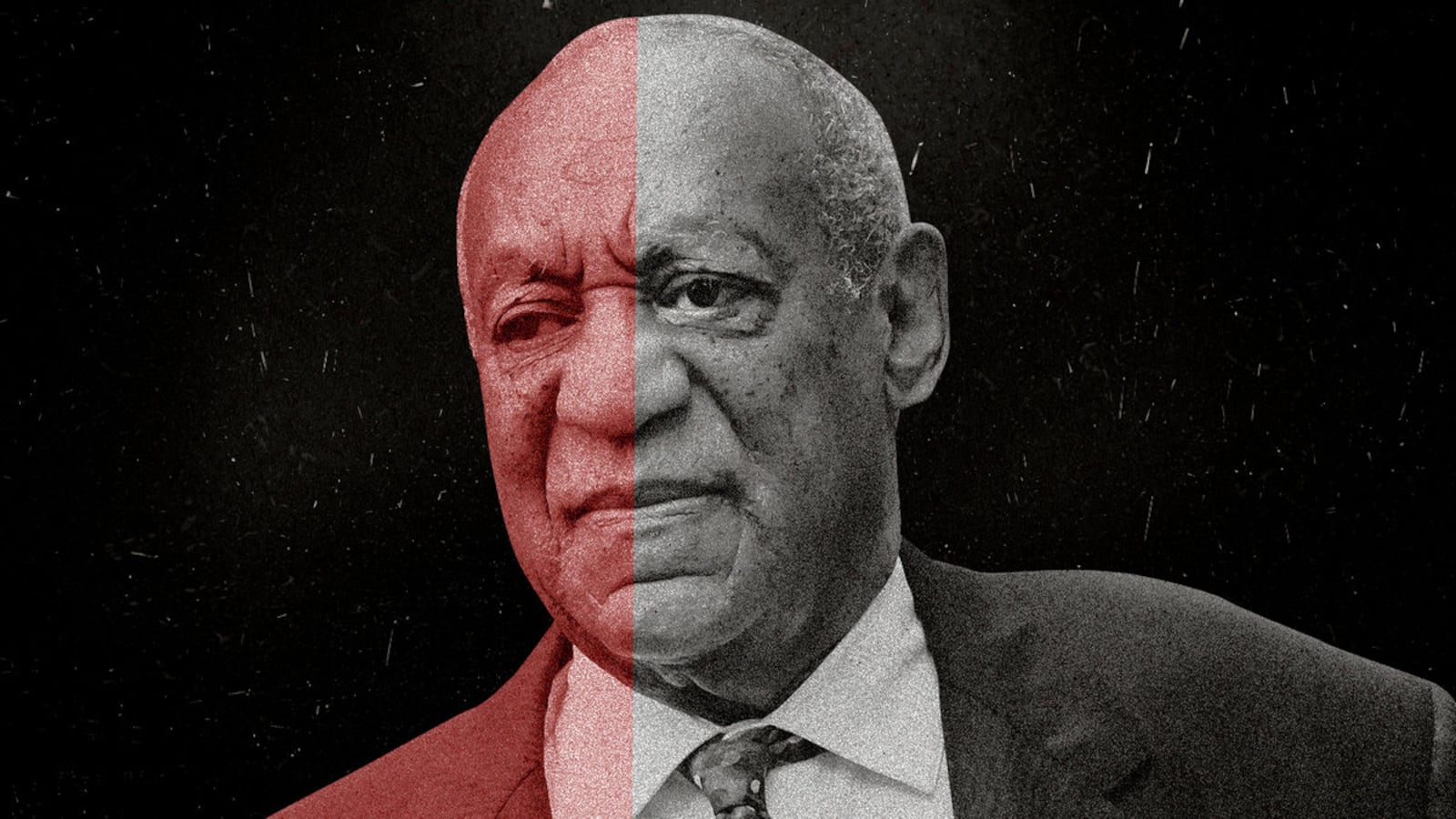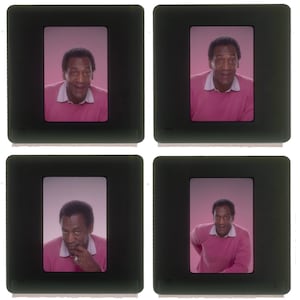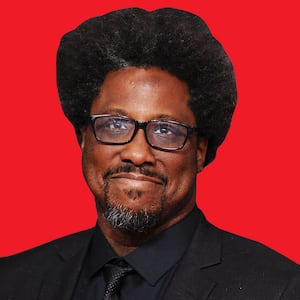W. Kamau Bell returns to the The Last Laugh podcast this week to discuss his illuminating new four-part documentary series We Need to Talk About Cosby. And with his career as a comedian and filmmaker on the line, he holds nothing back.
This sprawling conversation covers everything from Bell’s early admiration for Bill Cosby to the shattering of those illusions when Cosby’s rape allegations came to light, and why he thought his big project might be dead when the disgraced comedian was suddenly released from prison last summer. We also talk about why The Cosby Show cast members have been so reluctant to speak out against “America’s Dad,” whether Bell is able to separate the art from the artist, and so much more.
“I have to be honest, it still feels weird to hear people say ‘congrats’ considering what this is about,” Bell tells me when I congratulate him on the massive accomplishment that is his new documentary series.
Among the comedian-turned-director’s biggest influences going into the project were Surviving R. Kelly director dream hampton, who braved fierce backlash to her exposure of that Black icon’s crimes, and Ezra Edelman, who made the controversial decision to show O.J. Simpson breaking tackles before breaking down how he became the most famous man to be acquitted of double homicide in his Oscar-winning documentary O.J.: Made in America.
Like Edelman, Bell dares both viewers and his interview subjects not to laugh at Cosby’s most beloved comedy moments before confronting his crimes.
“Even though people might have heard those pieces before and they’ve all seen The Cosby Show before, in that moment they’re connecting with something that is out of their rational brain,” Bell explains. “And on top of that, you get to see their instant response when it hits them: ‘Oh yeah, there’s actually something else quite serious I have to contend with now.’”
And Bell does not flinch when it comes to detailing what dozens of women say Cosby did to them over the course of decades.
From years of having difficult conversations on his CNN show United Shades of America, Bell knew that he not only had to ask questions he genuinely wanted answers to, but he also had to imagine what viewers at home needed to better understand—including why it took some of these women so long to speak out about Cosby.
Among them is Patricia Steuer, who publicly accused Cosby in 2015 of drugging and raping her in the late 1970s when she was 22. In the exclusive clip below from part 2 of We Need to Talk About Cosby, which will air on Showtime next Sunday, Feb. 6, Steuer explains, “I felt stupid. I felt naive. I felt ashamed. I felt angry.”
Since she was made by Cosby to feel that the entire incident was her “fault,” Steuer asks, “With his reputation the way it was, and believing that no one would believe me if I did, why would I talk about it?”
Below is an edited excerpt from our conversation. You can listen to the whole thing right now by subscribing to The Last Laugh on Apple Podcasts, Spotify, Google, Stitcher, Amazon Music, or wherever you get your podcasts, and be the first to hear new episodes when they are released every Tuesday.
You have so many great interview subjects in this film. I would imagine that you tried to get more people from the cast of The Cosby Show to talk to you. Is that true? And why do you think they have been so hesitant to criticize him over the past several years?
I would say just generally, the stack of noes from people we asked next to the stack of yeses— the noes is a skyscraper.
That’s how it often works, right?
Yeah, but I mean, often the noes are a no because of scheduling. Believe me, as someone who was a part of calling people up and saying, “Do you want to talk about Chris Rock?” [for his 2018 documentary about Chris Rock’s Bring the Pain], I don’t know if the noes were dwarfed by the yeses, but a lot of times they were like, “I’m just not free that day.” So I would say this: I think they don’t want to engage in this for the same reason that a lot of people don’t want to engage with this. It’s divisive, no matter how nuanced you try to be, as I’m finding out right now. This doc is trying to go, “Look at this good thing, now look at this bad thing, and can we learn something between these things?” And I think a lot of people feel like that’s just really hard to do. And it is. And a lot of people are already on the record in the way that they want to be on the record. So I think they say, “Why would I go down this divisive road again, if generally, my fanbase isn't thinking about it right now?” And to be clear, I don’t blame these people after what I’ve seen and after what I’ve heard the survivors went through. And also, I won’t say any names, but I had some incredible conversations and some hourlong noes.
That’s tough.
Not really. I mean, I think the non-response to me is tougher than the hourlong conversation that says no.
But I could imagine it’s tough to speak to someone for an hour and be like, “Oh, I really wish that could be in the documentary.”
Yes, it is, then rough to go back to the team and go, ‘We didn’t get these people.’ And I also think it’s rough from the standpoint of, the more people said no—the kind of people you would expect to be in something like this—the more I realized that I was going to take up more space in this than I thought when I started. I thought I would be among the voices. And at some point, because so many people had declined, it was like, “Oh, now I’m basically the voice that leads you through,” which was not how I envisioned this. I really pictured making it more like O.J. Simpson: Made in America where you hear Ezra’s voice a couple of times, but nobody walks out of that and goes, “I know what Ezra Edelman thinks about O.J. Simpson.”
Were there other people besides The Cosby Show cast that you really wanted to be in it and just couldn’t or wouldn’t for some reason?
I mean, everybody that you think you would want to see; the cultural commentators, the stand-up comics. I just don’t want to name them by name because I don’t think it’s about shaming them. If they want to speak out on it if somebody asks them, please feel free. But I get it in even a more profound way—now that I’ve gone through it and I’m going through it—than I did before.
For me, the really striking narrative that went through the entire thing is the way Bill Cosby made himself into a trusted figure. He became a doctor by getting that degree, which you throw into question, whether he actually wrote his dissertation—
Hey, we just do what many people before us have done. [laughs]
He became “America’s Dad” on The Cosby Show. He’s playing an OB-GYN and has his office in his basement where women are coming to him. And being on children’s shows so that he would be a friendly figure. Was that something that you had in mind that you wanted to thread through it, or did that develop through the process?
You know, when we started this, it was me and three people in a conference room in Oakland, which is where all the revolutions start. All the greatest projects come from conference rooms in Oakland—the Black Panthers, the Black Panther movie. And one of the people who was in that room was Jamilah King, who’s a journalist who at the time was with Mother Jones, but is now with BuzzFeed. And she was there because I wanted that kind of journalism brain. And as we started to piece together the timeline of his life and the timeline of his career and the timeline of the assaults, things started to emerge. It feels very much like the movie A Beautiful Mind. You start to see things and you start to see bread crumbs and you also start to read more into it. It’s not an accident that Cliff Huxtable and Bill Cosby wore the same sweaters. He is trying to blur that line. Some actors who are on sitcoms don’t want you to actually think they’re the character. Jerry Seinfeld doesn’t even want you to think he’s Jerry Seinfeld. But it was very clear that there was a calculation there. And by all rights, Cliff Huxtable should have been “America’s Dad,” not Bill Cosby.
But he wanted to be “America’s Dad” to gain people’s trust.
I believe he wanted that power.
So there’s that, which he’s doing seemingly actively, and then there’s this flipside where he’s kind of telling on himself throughout his work, starting with the “Spanish Fly” bit from his stand-up and then the barbecue sauce scene from The Cosby Show. Why do you think he was brazenly talking about this stuff in his work?
The great thing about this is there’s so many great conversations I have with these people that we recorded. I think Kliph Nesteroff, the incredible comedy historian, brought up the idea of, a narcissist doesn’t think they’re doing anything wrong. If they did it, then it’s right. I can’t diagnose anybody, but I think on some level it felt like, “If I’m doing it, it’s right.” We don’t get into the deep level of his personal psychology, but we do have therapists and psychologists in there who are saying, this is how a person like this would commit their predation.
I knew about the Spanish Fly thing more than the barbecue sauce stuff. I mean, I’d obviously seen the barbecue sauce thing from The Cosby Show, which I guess runs through several different episodes, but I totally blocked that out. I don’t think it registered with me as a kid watching. Was that your experience?
I know I’ve seen that and I have some memory of the barbecue sauce thing. There’s no way I didn't see it. And I didn’t notice anything. And I was older than you. I was 11, 12, 13. And it’s the same thing with “Bill Cosby Talks to Kids About Drugs.”
Oh yeah, that was very weird.
Yeah. the comedy album he recorded in the ’70s where it’s him just riffing with kids talking about what drugs do to you.
Uppers and downers.
And he acts out what a downer does to you. And you’re just like, “Dude, wouldn’t you want to steer clear of all of this stuff?” And he won a Grammy for that! And it’s not a very good album.
On your CNN show United Shades of America, you obviously have a lot of difficult conversations. But I would imagine that nothing really compares to these sit-downs that you have with the survivors in this series. You can tell how hard it was for them, and I’m sure for you as well. Can you talk about that a little bit and what that was like to sit down with these women and get them to tell their stories in a way that they might not always want to?
Well, I mean, it starts with this. There are over 60 survivors that we know about. We didn’t interview most of them, obviously. And we asked more than who said yes. So I think first, it starts with somebody wanting to buy into this project. And I think for the most part, they’re all sort of at the place of like, I feel like I’ve done my time, especially with him out of prison. So I think there’s a sense of, why would I do another one of these things? And if they are interested at all, then you have to say, which we made clear, it’s not just about the assault. We’re also going to talk about his career, which means they are also going to be people in here talking about him from a good perspective or the good work he did. And do you want to be a part of that specifically? That’s a big ask.
You don’t want them to then see it and say, “Wait, what’s all this positive stuff doing in here?”
Yes. And I’m still nervous about that. But I think so far, most of them have seen it and have appreciated it. I think the ones who said no didn’t trust us and maybe thought we were trying to pull a fast one, and I accept that. It’s Hollywood calling, you know? But one of the things that encouraged some of them to do it is that they knew my work from the United Shades of America.
They trusted you in that sense.
They trusted me in the sense of like, I’ve seen him, I already like him having difficult conversations. So if somebody’s going to do this, maybe it’s going to be him. So I think that’s the thing that really helped us–the fact that I had this reputation. So I also think they felt like they could be vulnerable. And, let me be clear–and this is what I’ve learned from United Shades–you don’t open the conversation with, “Tell me what happened that night.” These are two-hour, sometimes over two-hour conversations where what we learned quickly was the more you talk about their lives and who they were and who they were before and how they grew up, the more the story starts to come together, more than just one woman having an interaction with Bill Cosby. You start to see them as three-dimensional people and allow them to be experts in their field. So I think by the time you get to their connection to Bill Cosby, we didn’t just walk into the room cold, like you would do on the news or something.
I really like how you address the pushback when this all started coming out just a few years ago, which was, why didn’t they talk about it at the time? Why are you just talking about this decades later? And I think the interviews, the conversations that you have, really give a lot of insight into why women don't necessarily talk about it or don't want to talk about these things publicly at the time. Did it give you a better understanding of that, talking to them?
For sure. To me, this was, like a lot of the work I do, I’m asking these questions because I want to know the answers. Because I’m curious and I don’t know. And you have to ask the questions you know the people at home have. So yeah, when I first heard about this, I had some of those same questions, and the answers are always so clear that of course they’re true. There’s no debate at that point. We, as a country, do a horrible job at dealing with people, women specifically, who’ve been sexually assaulted or raped. So it makes perfect sense to me that a woman who was raped by anybody, first of all, would be reluctant to tell the police or her community. And second, if that man is as powerful as Bill Cosby, that’s even more true.
Next week on ‘The Last Laugh’ podcast: Bridget Everett, star of HBO’s ‘Somebody Somewhere.’



